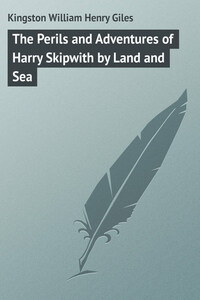“What! Ned Raymond ahoy! Heave to, lad. What! dost seek to give a wide berth to an old friend? That once was not your wont. Ned Raymond ahoy, I say!”
The slight dark moustache on the lip of the person addressed showed that he had just reached the age of manhood. His raven hair hung in ringlets from his head. A black velvet cloak thrown over one shoulder, and a tightly-fitting dress of the same material and hue, set off his well-made, active figure. His plumed cap and the sword by his side showed that he claimed to belong to the upper rank of society. Indeed, no one looking at the refined expression of his features and his intelligent countenance could doubt that such was his right. He was walking somewhat rapidly through the narrow and irregularly-built streets of the seaport town of Plymouth, at that time one of the chief ports of departure for the numerous naval expeditions which went forth to the West and to the East in search of new lands, and of regions of gold and diamonds and other precious stones.
It is worthy of remark that the people of Devonshire and Cornwall have from the earliest days shown a strong propensity for naval adventure. This arises not alone from their geographical position, but has descended to them from their progenitors, who were, there can be but little doubt, Phoenicians, – or their descendants the Carthaginians, perhaps, – sailors, merchants, and others attracted from the northern shores of Africa for the sake of the tin found in those counties. Even at the present day many of their customs and the nautical terms they employed are retained. The clotted cream of Devonshire and on the coast of Barbary is the same, as is the mode in which the people manage their farms. Caboose was the name of the temple carried by the fire-worshipping Phoenicians on the decks of their vessels; the cook’s house on board ship is now so called. Davit in Arabic is a crooked piece of wood; the same term we apply to the timbers by which boats are hoisted up to the sides of ships. However, we are now talking of more modern days, and must proceed.
Good Queen Bess sat on the throne of England, and ruled the realm as few sovereigns have done before or since, greatly to the furtherance of Britain’s glory and wealth, and to the firm establishment of religion and true liberty, for which let all honest Englishmen be grateful, and talk not of her womanly weaknesses and failings.
The young gentleman, hearing his name called, stopped and looked earnestly at the person who had addressed him, and who was following rapidly in his footsteps. The costume of his pursuer was far more gay and dashing than was his, being composed of bright-coloured velvet and silks, with a golden chain round his neck, a plumed hat set jauntily on his head, and a jewel-hilted sword by his side. He had a laughing blue eye and light curling locks, and though his countenance was well bronzed, and his voice strong and manly, his features still bore the impress of early youth. Indeed, his hairless lip and beardless chin showed that he had scarcely emerged from boyhood. He ran up to the person of whom he was in pursuit, and frankly held out his hand.
“Really, sir, you have the advantage of me,” said the elder gallant, gravely drawing himself up.
On this the younger gave way to a merry peal of laughter, exclaiming, “If I am changed, surely you are not, good coz. I see that. What! Ned – Ned, most oblivious of mortals, don’t you remember little Tony Waymouth, whom you pulled out of the water just in time to prevent him from becoming food for the fishes, at the risk of your far more valuable life, and to whom you ever gave the best of advice, and set the best of examples, neither of which, graceless vagabond that he was, is, and I fear ever will be, he took or followed?”
There was no longer any hesitation on the part of the elder in seizing the proffered hand, but he found his fingers wrung in so hearty a way, and with so vice-like a grasp, that he could scarcely refrain from crying out with pain.
The lad saw by the expression of his friend’s countenance that in the warmth of his affection he had really hurt him.
“Marry, pardon me, dear Ned, that my fingers have been thus heedless. They have been so accustomed to haul at ropes, tug at the oar, and dabble in the tar-bucket, that they have, like their owner, lost, I fear me, all civilised habits and customs,” he exclaimed, exhibiting his horny-palmed, thoroughly-bronzed hand.
“Say not a word, Tony,” answered Raymond. “Far rather would I feel the grasp of thy honest fist than the gingerly touch of the soft-palmed courtier. But tell me, lad, where hast thou been these long years since we parted at school, where I fear me, Tony, there was not much knowledge packed away in that then small head of thine? I have heard rumours of your existence, and that is all.”
“Wandering over the ocean, and battling with the elements and strong-armed men,” answered young Waymouth. “But the spectacle of two such gay gallants as we are in this quiet street has already attracted attention. I see down there the Sign of the White Swan, a good hostelrie, I know. Let us step in there; it is about the hour of dinner, and I know full well that we shall find a cup of good sack to wash down the viands. While discussing it I will tell you briefly of my doings and listen gladly to yours. I long to hear of your past life and future prospects.”














